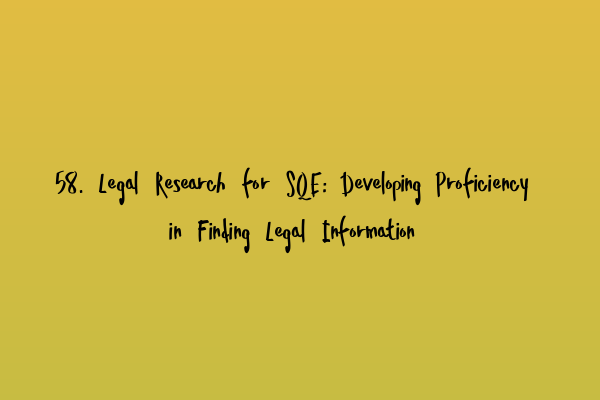Legal Research for SQE: Developing Proficiency in Finding Legal Information
Aspiring solicitors must possess a wide range of skills in order to succeed in the SQE exams. One crucial skill that cannot be overlooked is the ability to conduct effective legal research. Developing proficiency in finding relevant legal information is not only essential for passing the exams, but also for becoming a successful solicitor in practice. In this blog post, we will explore the importance of legal research in the SQE exams and provide some tips on how to develop your research skills.
Why is Legal Research Important in the SQE Exams?
Legal research is a fundamental part of the SQE exams for several reasons. First and foremost, it allows you to find the necessary legal authorities and apply them to the given scenario or problem question. Without proper research, you may miss key precedents or legislation that are essential for constructing a strong legal argument.
Furthermore, legal research helps you demonstrate your understanding of the law. By showcasing your ability to find and analyze legal information, you show the examiners that you have a solid grasp of the subject matter. This is particularly important in the SQE exams, where the emphasis is on practical legal skills and the application of legal principles to real-life scenarios.
Lastly, effective legal research is crucial for time management. SQE exams are time-pressured, and you need to quickly locate the relevant legal authorities to answer the questions within the allocated time. By developing efficient research techniques, you can maximize your chances of completing the exam and achieving a high score.
Tips for Developing Proficiency in Legal Research
Now that we understand the importance of legal research in the SQE exams, let’s explore some tips for developing proficiency in this vital skill:
1. Familiarize Yourself with Legal Databases
Legal databases are invaluable tools for legal research. These platforms compile an extensive collection of case law, legislation, and other legal materials that can be easily searched and accessed. As a future solicitor, it is essential to familiarize yourself with commonly used legal databases, such as LexisNexis, Westlaw, or Justis. Take the time to explore their features and functionalities, as this will greatly enhance your research efficiency.
Here are some articles to help you in familiarizing yourself with legal databases:
- Conquer the Multiple Choice Questions (MCQ) in SQE1
- Mastering Effective Revision Techniques for SQE Success
- Interactive mock tests for SQE: Enhancing engagement and learning
- SQE Sample Papers: Practice for Exam Success
- Focus Areas in SQE1 and SQE2: Mastering Key Concepts
2. Understand Keywords and Search Techniques
Mastering keywords and search techniques is essential for efficient legal research. When formulating your search queries, be sure to use relevant and specific keywords that are directly related to your research topic. Additionally, familiarize yourself with advanced search techniques, such as Boolean operators (AND, OR, NOT) and quotation marks for exact phrase searching. These techniques can help you narrow down your search results and find the most relevant legal authorities.
3. Develop Critical Analysis Skills
Legal research is not just about finding the legal authorities; it also involves critically analyzing and evaluating the information you find. When conducting research, carefully consider the authority and reliability of the sources, as well as the relevance and applicability of the legal principles to the given scenario. Developing critical analysis skills will enable you to identify the most persuasive precedents and effectively apply them to your argument.
4. Practice, Practice, Practice
Like any other skill, legal research requires practice. Familiarize yourself with past SQE exam questions and practice researching and answering them within the time constraints. This will not only help you hone your research skills but also familiarize yourself with the types of legal authorities that frequently appear in the exams. Additionally, consider taking advantage of interactive mock tests to further enhance your engagement and learning.
Remember, developing proficiency in legal research is an ongoing process. Continuously seek opportunities to refine your skills and stay updated with the latest legal developments. With dedication and practice, you will become a proficient legal researcher and excel in the SQE exams.
Good luck!
